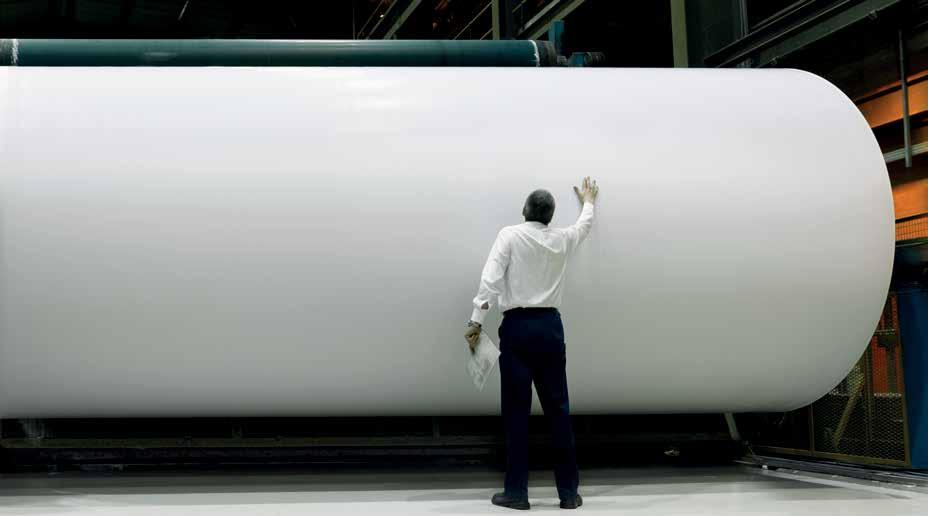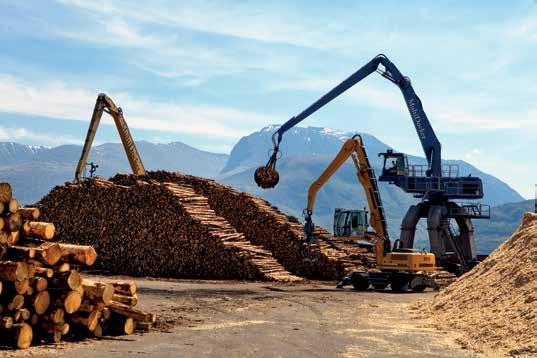
4 minute read
MEMBER PROFILE
Workington supersize
The Confor team (right) recently enjoyed a fascinating visit to member site Iggesund Paperboard in Workington – about as far north and west as it’s possible to go in England. Stuart Goodall reports.
The Workington site is strategically located to a port and plentiful supplies of fresh water that are a crucial element of the process to produce 200,000 tonnes of paperboard a year under the market leading brand name Incada.
The area had been home to iron and steel mills, so investment in a new manufacturing process in the 1960s has helped secure relatively well-paid jobs in a geographically remote location. Originally Thames Board Mills, Workington has been producing high quality folding boxboard since 1967.
We were welcomed to the site by Gavin Davidson, who as well as being a Board member of Confor is Forestry General Manager and Fibre Buyer at Iggesund Paperboard, and our entertaining tour guide for the
day Phil Baggley, Technical Service Manager.
The Workington mill (not to be referred to as a factory!) is an integrated pulp and paperboard mill. Since 2013, it has been powered entirely by bioenergy, producing around 50Mw of electricity and 150Mw of steam. A further 7Mw (approximately) can be exported to the grid to coincide with periods when electricity demand is high and it’s relied upon as base-load energy for times when, for example, it’s frosty and the wind isn’t blowing.
The site consumes one million tonnes of virgin fibre a year, with two-thirds of that being utilised in the biomass boiler. The feedstock for the site is diverse, including small roundwood, sawmill co-product and willow coppice. For the latter, Iggesund enter into agreements with lo


cal farmers to guarantee to buy their crop for the predicted life-span of the biomass boiler.
The remaining volume is Spruce fibre in the form of roundwood and sawmill chips that are used in the production of Folding Box Board (FBB). Iggesund Forestry have been pioneers in transporting roundwood by sea dating back to over thirty years. The material is shipped from


a variety of locations up the west coast of Scotland and as far north as Caithness and round to Aberdeenshire arriving at the nearby Port of Workington.
Workington’s sister mill in Sweden (Iggesund is part of the Holmen group) produces Solid Bleached Board (SBB) and Phil explained the key differences between the two products and the various other forms of board that is popularly produced in Europe and globally. These embrace everything from ‘utilitarian’, lower-quality board that is used for items like cereal boxes to the FBB and SBB that Iggesund produce that ends up as packaging for medicines or whisky – neither of which were on offer through our tour…
The size and complexity of the equipment required to produce the board is quite staggering as is the many interconnected stages that the fi bre passes through before it emerges as clean white sheets measuring 5.5 metres across wound onto massive rolls at typically 40 tonnes per hour. These are then cut to size and shipped to their customers in either reel form or sheet form, depending upon the type of print process they employ. Around 60% of Incada is exported.
Repeated multi-million pound investments have been made to ensure that the mill is competitive in an international market. The process is linear, meaning addressing bottlenecks can signifi cantly improve output, uptime and quality.
The process uses Sitka spruce because customers demand the quality that the longer fi bres and the whiteness produce – spruce needs less chemical to whiten. Timber is ideally ‘hot-harvested’ as it’s more effi - cient to start the process with green wood.
UK grown Sitka spruce is fundamental to the manufacture of Incada. Logs and chips are reduced to pulp in a mechanical process that retains Lignin. The combination of Lignin and the Spruce fi bres facilitate the production of a light weight, high performing boxboard. Since customers are always looking for greater quality, consistency and value, Iggesund are committed to sourcing from UK forests in the pursuit of long term, sustainable manufacture. With the global switch away from plastic based packaging and fossil fuels they are particularly well placed to face future challenges
It is always important for the Confor team, especially those who spend nearly all their time in the offi ce, to see and experience some of the day-to-day work of the businesses operating in our sector, and everyone left hugely impressed by the professionalism of the people we met, and the welcome they provided us with.
It also demonstrated the continuing reliance of signifi cant parts of the UK’s wood processing industry on Sitka spruce and its superior performance as a manufacturing feedstock for high value products – products that are a great advert for our industry. www.iggesund.com
A short video on The Workington Mill provides an excellent overview of the process. www.iggesund.com/about/ global-presence/theworkington-mill










